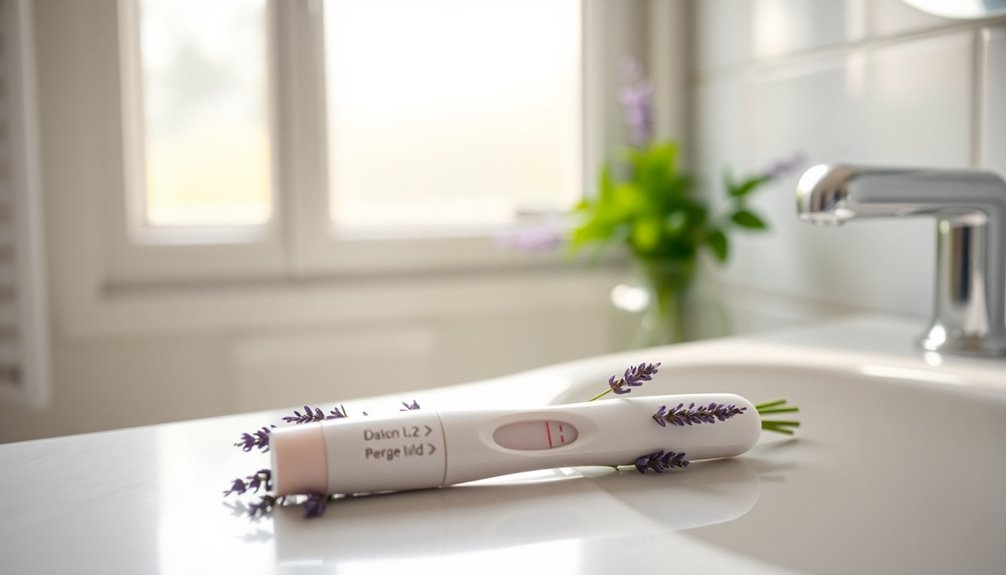To know if you're pregnant after sex, start by watching for early signs like a missed period, breast tenderness, fatigue, or nausea. These symptoms may occur within a week or two after conception. You can take a home pregnancy test about 6-14 days following potential fertilization; waiting until after your missed period tends to yield the most accurate results. If the test is negative but you still suspect pregnancy, consider retesting in a week. Keeping track of any unusual symptoms will also help you understand what's going on with your body. Learn more about the next steps you can take.
Key Takeaways
- A missed period is often the first sign of potential pregnancy after unprotected sex.
- Early symptoms like fatigue and breast tenderness may develop within a week or two post-conception.
- Look for signs of implantation, such as mild cramping and light spotting 6-12 days after fertilization.
- Home pregnancy tests can detect pregnancy 6-14 days after fertilization, with best results after a missed period.
- Consult a healthcare provider for blood tests for earlier and more accurate pregnancy confirmation.
Timeline of Early Pregnancy
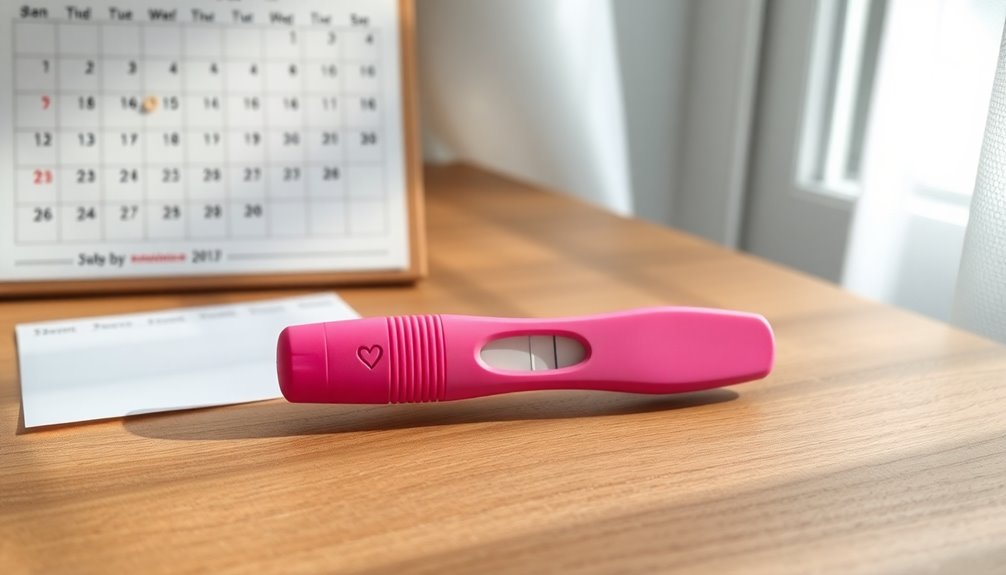
Understanding the timeline of early pregnancy can help you recognize the signs sooner.
Pregnancy officially starts on the first day of your last menstrual period, even though conception happens later. About 14 days after your last period, ovulation occurs, marking your fertile window.
If fertilization happens when sperm meets the egg, the embryo will implant in your uterine wall in about 6 to 10 days. During the first two weeks, you typically won't notice any pregnancy symptoms, which means many women don't realize they're pregnant until after implantation.
If you've missed your period, it's often one of the first early signs of pregnancy. Knowing this timeline helps you stay alert for any changes in your body.
Recognizing Early Symptoms
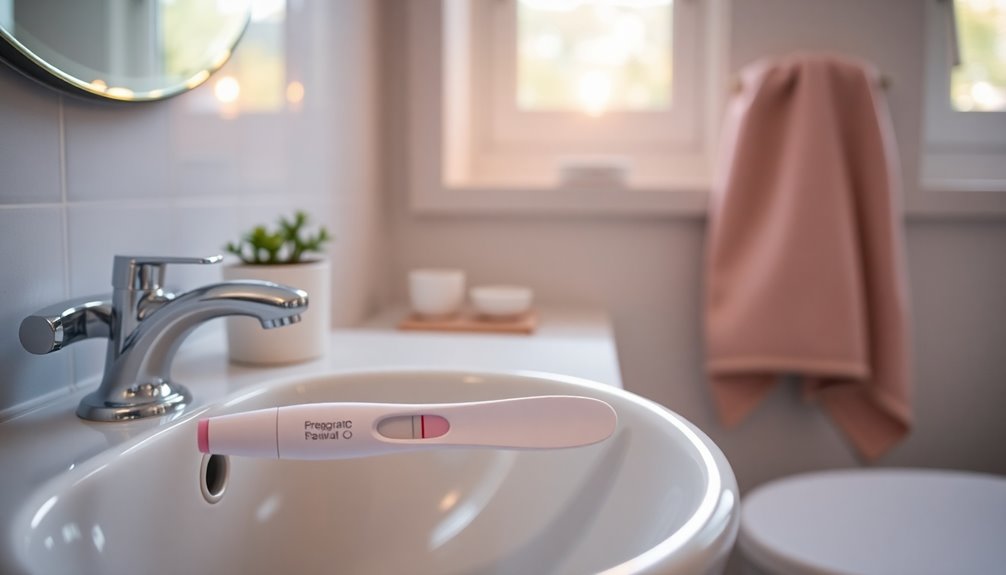
Once you think you might be pregnant, pay attention to common early symptoms that could signal a change.
You might notice fatigue, breast tenderness, or even light cramping shortly after conception.
Recognizing these signs can help you determine if it's time to take a pregnancy test.
Common Early Symptoms
You might notice several common early symptoms if you suspect you're pregnant after sex. One of the most significant signs is a missed period, often prompting you to take a pregnancy test. Other early pregnancy symptoms include:
| Symptom | Timing | Description |
|---|---|---|
| Nausea | 6 weeks or earlier | Often begins as morning sickness |
| Breast tenderness | 1-2 weeks post-conception | Swelling and sensitivity in the breasts |
| Fatigue | Within first few weeks | Increased progesterone levels cause tiredness |
Additionally, you may experience mild cramping and light spotting due to implantation. Recognizing these symptoms can help you determine if a pregnancy test is necessary.
Hormonal Changes Indicators
After identifying common early symptoms, it's important to recognize how hormonal changes can indicate pregnancy.
In the weeks following conception, you might notice breast tenderness and swelling due to elevated progesterone levels. Fatigue often sets in as early as 5-6 days post-fertilization, driven by these hormonal changes.
Keep an eye on your basal body temperature, too; if it remains elevated after ovulation, it could signal early pregnancy. Mood swings and emotional fluctuations are other common signs of pregnancy, stemming from significant hormonal shifts.
Additionally, nausea, often called morning sickness, can begin around 6 weeks after conception, but some experience it earlier due to these hormonal influences. Recognizing these indicators can help clarify your situation.
Timing of Symptoms
Although early symptoms of pregnancy can vary from woman to woman, recognizing their timing is essential for understanding your body.
Typically, early pregnancy symptoms emerge around 5 to 6 weeks after conception, coinciding with a missed period. Some women may notice signs like breast tenderness, fatigue, and nausea as soon as one week post-conception.
Implantation occurs 6 to 12 days after fertilization, potentially causing mild cramping and light spotting, which can be mistaken for PMS. Hormonal changes following implantation often lead to mood swings and food cravings.
For the most accurate results, take a pregnancy test after your missed period, as detectable levels of human chorionic gonadotropin (HCG) usually appear 6 to 14 days post-fertilization.
Understanding Pregnancy Testing
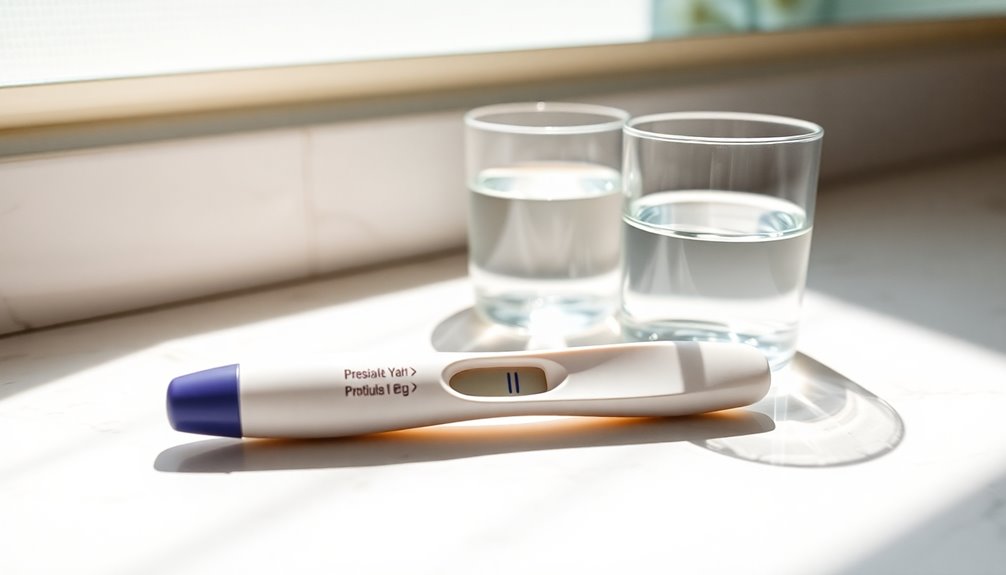
When trying to determine if you're pregnant, understanding how pregnancy tests work is essential. Home pregnancy tests measure hCG levels in your urine, detecting this hormone typically 6-14 days after fertilization.
For the most accurate results, wait until after your missed period. While some newer tests claim to detect pregnancy 4-5 days early, testing too soon may lead to false negatives.
If your home pregnancy test is negative but you still suspect pregnancy, wait a week and retest for better accuracy. You might also consider a blood test at your healthcare provider's office, which can confirm pregnancy earlier but may take longer for results.
Always consult a healthcare professional for confirmation and guidance, especially if you're experiencing symptoms.
Implantation Changes

After fertilization, you might notice some cramping or light spotting as implantation occurs.
This can feel like mild discomfort in your lower abdomen or back and may be mistaken for your period.
Along with these changes, hormonal shifts can bring on early pregnancy symptoms like breast tenderness and fatigue.
Cramping and Spotting Signs
Cramping and light spotting can be some of the earliest signs of pregnancy, often occurring between 6 to 12 days after fertilization. This happens as the embryo implants itself into the uterine wall.
You might notice:
- Light, pinkish or brownish discharge (implantation bleeding)
- Mild cramping in the lower abdomen
- Timing that coincides with your expected period
- Symptoms that could resemble premenstrual syndrome (PMS)
- Variation in experience; not every woman will have these symptoms
If you experience cramping and spotting, it could indicate early pregnancy symptoms.
Hormonal Changes Impacting Symptoms
Experiencing cramping and spotting can prompt you to contemplate the hormonal changes that occur once implantation takes place.
About 6 to 12 days after fertilization, your body begins producing human chorionic gonadotropin (hCG), a key hormone in early pregnancy. This surge in hCG triggers various early pregnancy symptoms, including fatigue and breast tenderness.
You might also notice increased progesterone levels, leading to breast swelling and mild cramping as your body prepares for potential pregnancy. Additionally, you may experience mood swings due to these rapid hormonal fluctuations.
If your basal body temperature remains elevated beyond typical ovulation, it can further indicate these hormonal changes, suggesting that pregnancy might be on the horizon.
Hormonal Effects on the Body
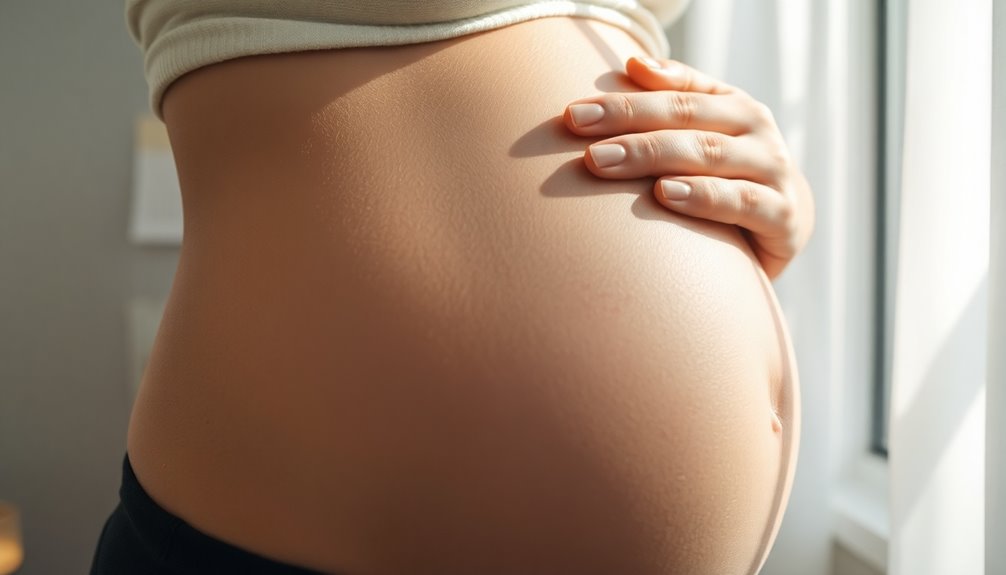
When pregnancy occurs, your body undergoes significant hormonal changes that can impact various aspects of your health. These hormonal shifts are essential during early pregnancy, and you may notice several effects:
- Increased levels of human chorionic gonadotropin (hCG), detectable in tests
- Elevated progesterone, causing breast tenderness and fatigue
- Rising estrogen levels, affecting your emotional and physical well-being
- Changes in kidney function, leading to frequent urination
- Nausea, often referred to as morning sickness, which may start around the sixth week
These hormonal changes prepare your body for the developing pregnancy, but they can also bring about discomfort and a range of symptoms you might find challenging to manage.
Managing Suspected Pregnancy

If you think you might be pregnant after sex, it's important to pay attention to early signs like a missed period, breast tenderness, or fatigue.
Nausea can also appear as early as one week post-conception. To confirm your suspicion, take a home pregnancy test after your missed period for the most accurate results, as these tests detect the hormone hCG.
If the test is negative but you still suspect pregnancy, wait a week and retest, since false negatives can occur if taken too early.
If you receive a positive result or if symptoms persist, consult a healthcare provider for confirmation and guidance on prenatal care.
Until then, maintain a healthy lifestyle to support your body during this uncertain time.
Dietary Recommendations

After confirming your pregnancy, focusing on your diet becomes vital for supporting both your health and your baby's development. A balanced diet rich in key nutrients will help you manage common symptoms and guarantee proper fetal growth.
Consider incorporating the following into your daily meals:
- Dairy products for calcium
- Lean proteins like chicken and fish
- Leafy greens and a variety of fruits
- Whole grains for energy
- Staying hydrated with plenty of water
Don't forget to start taking prenatal vitamins, especially those containing folic acid, to prevent neural tube defects.
Limiting caffeine and avoiding processed foods, alcohol, and recreational drugs are also important for maintaining a healthy pregnancy.
Importance of Prenatal Care
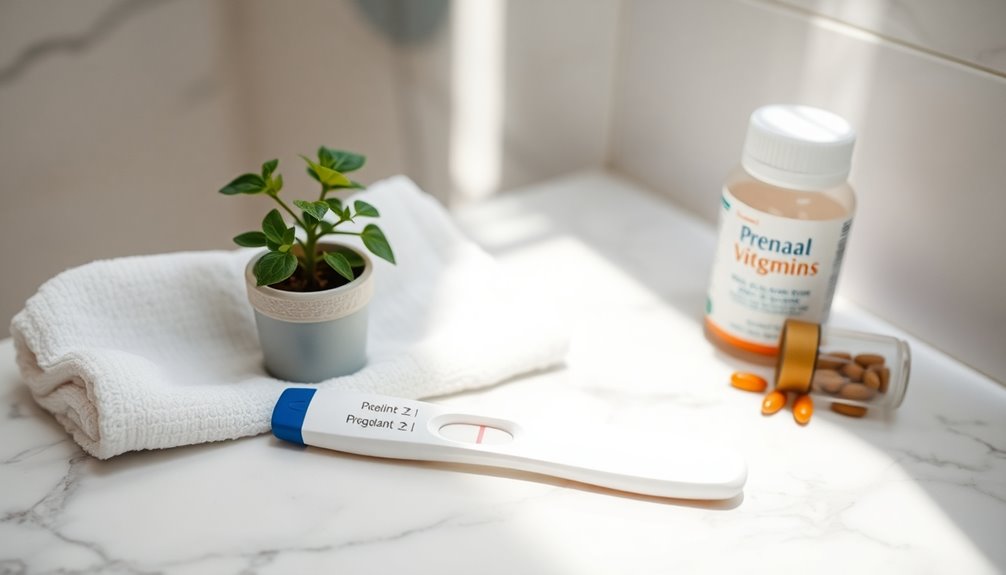
Prenatal care plays an essential role in ensuring the health of both you and your baby throughout pregnancy. After you receive a positive pregnancy test, it's important to schedule regular check-ups with your healthcare provider.
These visits help monitor the health of both you and your baby, identifying potential risks and complications early on. Prenatal vitamins, especially those with folic acid, support fetal growth and prevent neural tube defects.
Your healthcare provider can also give personalized advice on nutrition, exercise, and lifestyle changes to promote a healthy pregnancy. Studies show that women who receive consistent prenatal care experience fewer complications and better outcomes, including lower rates of preterm birth.
Prioritizing prenatal care is significant for a safe and healthy pregnancy.
Next Steps After Testing
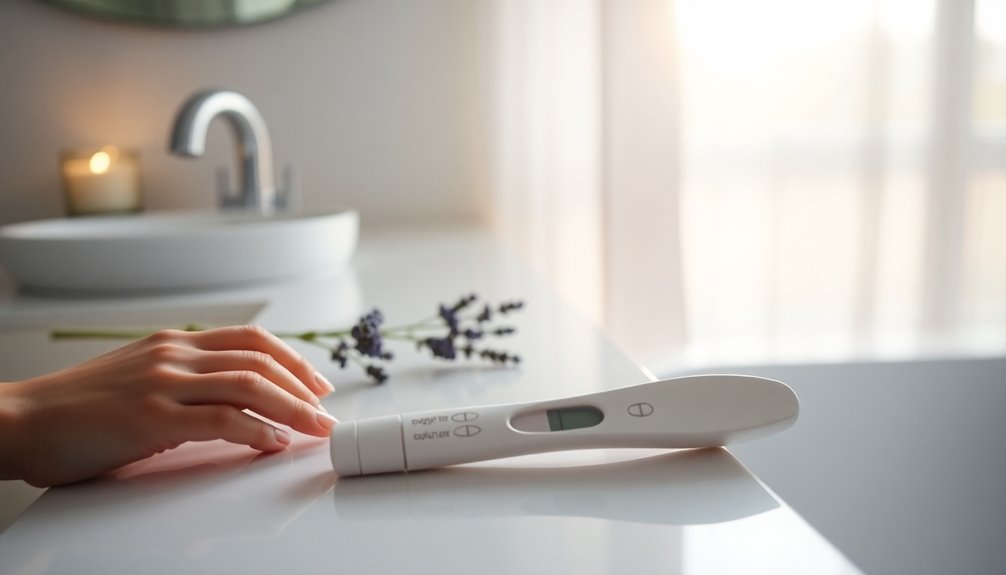
Once you've confirmed your pregnancy with a positive test, scheduling a doctor's appointment should be your next priority. This visit will help confirm your pregnancy and kickstart essential prenatal care.
During your appointment, expect to discuss:
- Your medical history and lifestyle
- Any medications you're currently taking
- Early pregnancy symptoms like nausea or fatigue
- Recommendations for prenatal vitamins, especially folic acid
- A plan for regular check-ups throughout your pregnancy
Being prepared will guarantee you receive personalized guidance for a healthy pregnancy.
If your test was negative but you suspect you're pregnant, wait a week and retest or consult a doctor for further evaluation. Taking these steps will help you navigate this exciting journey confidently.
Frequently Asked Questions
Can You Tell if You Got Pregnant Right After Sex?
You can't tell if you got pregnant right after sex.
Fertilization usually happens 12-24 hours later, so immediate signs aren't possible. You might start noticing symptoms like nausea or breast tenderness about 5-6 weeks after your last period, but these aren't definitive right away.
Most women find out after a missed period, typically two weeks post-ovulation. For accurate results, home pregnancy tests work best after that missed period, detecting hCG hormone levels.
How Do I Know if I'm Pregnant if I Just Had Sex?
If you just had sex, you won't know for sure if you're pregnant right away.
Symptoms often take time to appear, usually around a week after conception. You might notice a missed period or some mild cramping later on.
For the most accurate results, wait until after your expected period to take a home pregnancy test.
If you're unsure, it's okay to retest a few days later for confirmation.
What Are the Signs of 2 Days of Pregnancy?
At just 2 days post-conception, you probably won't notice any definitive signs of pregnancy.
Your body hasn't had enough time to undergo hormonal changes that typically cause early symptoms. You might experience very mild cramping or spotting, but that's not guaranteed.
Most early indicators, like breast tenderness or nausea, won't appear yet.
To get reliable results, wait until at least a week after your missed period to test for pregnancy.
How Long Does It Take to Feel Pregnant After Sex?
Did you know that about 70% of women report experiencing early pregnancy symptoms within six weeks of their last period?
If you're wondering how long it takes to feel pregnant after sex, it can vary. You might notice signs like fatigue or breast tenderness as early as one week after conception, but most common symptoms appear around five to six weeks.
Pay attention to your body, and remember that everyone's experience is different!
Conclusion
In summary, recognizing pregnancy signs can feel like piecing together a puzzle. If you suspect you're pregnant, trust your instincts and take a test for clarity. Early symptoms, hormonal shifts, and your body's changes can guide you, just like a compass pointing north. Don't forget to prioritize prenatal care and a healthy diet as you begin this new journey. Whatever the outcome, remember you're not alone, and support is always within reach.

